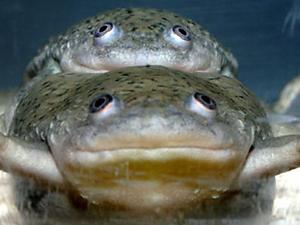

Research Expertise and Interest
genetics, amphibians, developmental endocrinology, steroid hormones, metamorphosis, sex differentiation, hormonal differentiation, African clawed frog, Japnanes Kajika, Pine Barrens treefrog
Research Description
Tyrone Hayes is the Judy Chandler Webb Distinguished Chair for Innovative Teaching and Research and a professor in the Department of Integrative Biology. His research focuses on the role of steroid hormones in amphibian development and he conducts both laboratory and field studies in the U.S. and Africa. The two main areas of interest are metamorphosis and sex differentiation, but he is also interested in growth (larval and adult) and hormonal regulation of aggressive behavior. His work addresses problems on several levels including ecological, organismal, and molecular questions. In his work on metamorphosis, he studies a local toad (Bufo boreas). Studies examine the effects of temperature on developmental rates, interactions between the thyroid hormones and steroids, and hormonal regulation of skin gland development. He is also examining the effects of tadpole density on developmental rates and measuring metamorphic rates and hormone levels of tadpoles in the field and in the laboratory. His work on sex differentiation involves the African clawed frog (Xenopus laevis), the Japanese kajika (Buegeria buegeri), and the Pine Barrens treefrog (Hyla femoralis). While Xenopus serves as a good model because of its availability, the latter two species have genetically distinguishable sexes. He can therefore examine early events in gonad differentiation, steroid enzyme activities, steroid receptors, etc., knowing the genetic sex of the individual larvae.
Currently, he is also examining the effects of exogenous steroids on gonadal differentiation and the potential role of endogenous steroids. His main goal is to synthesize ecological/evolutionary, organismal/physiological, and biochemical/molecular studies to learn how an animal translates changes in its external environment to internal changes, how these internal changes are coordinated, what molecular mechanisms are involved, and in turn, how changes at the molecular level affect an animal's ability to adapt to the changes in its external environment.
In the News
National Academy of Sciences Elects Seven From UC Berkeley
Six faculty elected to the American Academy of Arts and Sciences
Pesticide atrazine can turn male frogs into females
The herbicide atrazine, one of the world's most widely used pesticides, screws up the sex lives of adult male frogs, emasculating three-quarters of them and turning one in 10 into females, according to a new study by UC Berkeley's Tyrone Hayes.


